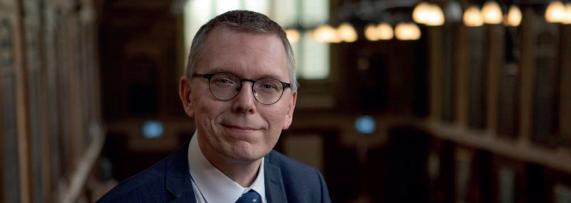
3 minute read
WITH DAVID GOODHEW
1
What / who initially motivated you to become a teacher, and why did you choose Classics as your subject?
I was very fortunate to be able to study Latin at my comprehensive school; we were also the last year that had the chance to study Greek. I loved the languages, as well as the fact that Classics is the ultimate subject. Indeed one derivation of the word ‘classics’ is from the Byzantine word meaning ‘a selection of all the subjects you should know to be an educated human being’. When I graduated from Oxford, I wanted to try a career that would allow me to share my passion for Classics, so I did a PGCE (teacher-training qualification). This allowed me to experience first-hand the joy of working in the most important and rewarding profession in the world. I’ve never looked back!
2
Why did you choose to join Latymer as Head, and how has that motivation evolved over your years in the role?

I was a Senior Deputy Head and felt ready to move into Headship. Latymer was the first, and only, school that I applied for: I didn’t expect to be appointed, as it was generally accepted that a school of Latymer’s calibre would be looking for someone who was already a Head and, in all probability, ten years older than I was. However, as a local boy, I knew Latymer well and thought it would be a good ‘practice go’. I was overwhelmed to be offered the job: I believe the Governors took a calculated
3
What do you consider to be your greatest successes during your time as Head, and why are they so meaningful to you?
I do not think I can claim credit for the many successes the school has achieved over the last decade. However, it means a lot to me that next year, thanks to the Inspiring Minds Campaign, 280 pupils will be at Latymer thanks to a bursary, including 1 in 4 of Year 7; we are on track for 1 in 4 of all the pupils in the school by 2024. When I started in 2012, there were 98 bursary pupils (fewer than 1 in 10). What we have achieved is fundamental to what gives Latymer its distinctive ethos and has set an inspirational example for other schools to follow. It has been a collective labour of love.
4
On a similar note, looking back over your time as Head, what are some of the most memorable moments or events that stand out to you, and why?
I will never forget hosting the pupils and staff from Kensington Aldridge Academy in the summer term of 2017. The fact that they all arrived punctually for their first Latymer assembly - three days after the Grenfell fire - spoke volumes about the importance of education. KAA’s motto is “intrepidus” and those students were an inspiration to all of us.
5
What will you miss the most about your time as Head?
The pupils: Latymerians are
6
What do you think are the biggest challenges facing the education sector currently, and how have you sought to address those challenges during your tenure as Head?
Poor mental health among teenagers is, in my view, the greatest challenge facing schools and parents. We have massively increased our pastoral support in all areas of the school over the last decade. We have also tried to be proactive about teaching tools for positive mental health, chiefly: sleep, exercise, nutrition, positive friendships in the real world and resilience.
7
What are your hopes for the future of Latymer?
Now that I am a Latymer parent, I naturally hope the school goes from strength to strength. I have every confidence that Su Wijeratna will change and improve the (many) things that can be better, while preserving the School’s unique ethos.
8
What legacy do you hope to leave?
I’m always very reluctant to talk in terms of ‘legacy’ – it feels too arrogant. I like Christopher Wren’s solution: “si monumentum requiris, circumspice”. I hope that anyone who knows Latymer will see the signs of my influence.
9
What message would you like to leave with the school community as you depart?
Thank you for your friendship –leading Latymer has been the honour of a lifetime.
10
Finally, now that you’re joining the ‘former Heads’ club’, how important do you feel the alumni community of students/staff is for Latymer, and schools in general?
It’s hard to overstate the importance of the alumni community – they taught me so much about Latymer and are the living legacy of the School. All of us, as former members of the Latymer community, can help each other in more ways than we realise.






